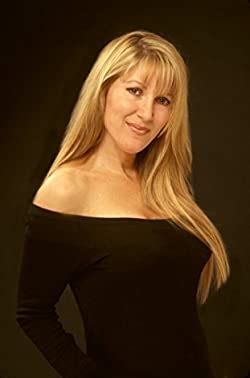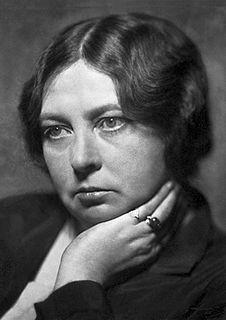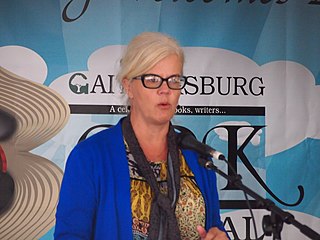A Quote by Anna Quindlen
Get a life in which you notice the smell of salt water pushing itself on a breeze over the dunes, a life in which you stop and watch how a red-tailed hawk circles over a pond and a stand of pines. Get a life in which you pay attention to the baby as she scowls with concentration when she tried to pick up a Cheerio with her thumb and first finger.
Related Quotes
She fell into a deep pool of sticky water, which eventually closed over her head. She saw nothing and heard nothing but a faint booming sound, which was the sound of the sea rolling over her head. While all her tormentors thought that she was dead, she was not dead, but curled up at the bottom of the sea.
My dog doesn't worry about the meaning of life. She may worry if she doesn't get her breakfast, but she doesn't sit around worrying whether she will get fulfilled or liberated or enlightened. As long as she gets some food and a little affection, her life is fine. But we human beings are not like dogs. We have self-centered minds which get us into plenty of trouble. If we do not come to understand the error in the way we think, our self-awareness, which is our greatest blessing, is also our downfall.
"What do you want out of life?" I asked, and I used to ask that all the time of girls. "I don't know," she said. "Just wait on tables and try to get along." She yawned. I put my hand over her mouth and told her not to yawn. I tried to tell her how excited I was about life and the things we could do together; saying that, and planning to leave Denver in two days. She turned away wearily. We lay on our backs, looking at the ceiling and wondering what God had wrought when He made life so sad.
For she was a child, throwing bread to the ducks, between her parents who stood by the lake, holding her life in her arms which, as she neared them, grew larger and larger in her arms, until it became a whole life, a complete life, which she put down by them and said, "This is what I have made of it! This!" And what had she made of it? What, indeed?
Her heart felt as if it were breaking in her breast, bleeding and bleeding, young and fierce. From grief over the warm and ardent love which she had lost and still secretly mourned; from anguished joy over the pale, luminous love which drew her to the farthest boundaries of life on this earth. Through the great darkness that would come, she saw the gleam of another, gentler sun, and she sensed the fragrance of the herbs in the garden at world's end.
If gold has been prized because it is the most inert element, changeless and incorruptible, water is prized for the opposite reason -- its fluidity, mobility, changeability that make it a necessity and a metaphor for life itself. To value gold over water is to value economy over ecology, that which can be locked up over that which connects all things.
She smiled. She knew she was dying. But it did not matter any longer. She had known something which no human words could ever tell and she knew it now. She had been awaiting it and she felt it, as if it had been, as if she had lived it. Life had been, if only because she had known it could be, and she felt it now as a hymn without sound, deep under the little whole that dripped red drops into the snow, deeper than that from which the red drops came. A moment or an eternity- did it matter? Life, undefeated, existed and could exist. She smiled, her last smile, to so much that had been possible.
The wide world was changing, and she wanted a different place in it. Not just wanted, but felt she deserved. If the world didn't owe her a living, as her mother repeatedly warned her, it owed her a break. She had a strong sense that a better, more exciting, more rewarding life than that which had been the lot of her parents and grandparents was hers by right. In this she was guilty of nothing more serious than the arrogance of youth, from which every generation suffers and by which it distinguishes itself from the preceding one.
She was made up of more, too. She was the books she read in the library. She was the flower in the brown bowl. Part of her life was made from the tree growing rankly in the yard. She was the bitter quarrels she had with her brother whom she loved dearly. She was Katie's secret, despairing weeping. She was the shame of her father stumbling home drunk. She was all of these things and of something more...It was what God or whatever is His equivalent puts into each soul that is given life - the one different thing such as that which makes no two fingerprints on the face of the earth alike.
When he held her that way, she felt so happy that it disturbed her. After he left, it would take her hours to fall asleep, and then when she woke up she would feel another onrush of agitated happiness, which was a lot like panic. She wished she could grab the happiness and mash it into a ball and hoard it and gloat over it, but she couldn't. It just ran around all over the place, disrupting everything.
































